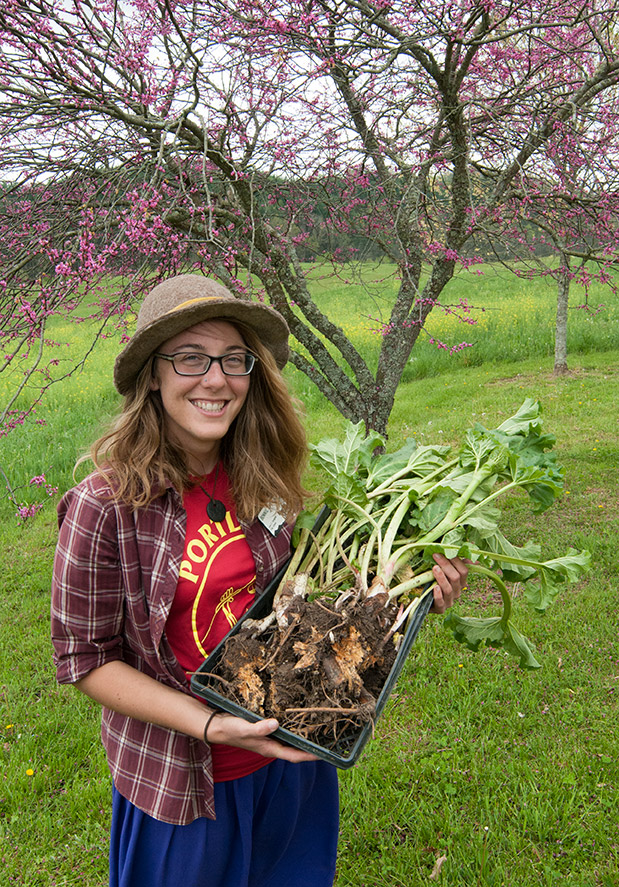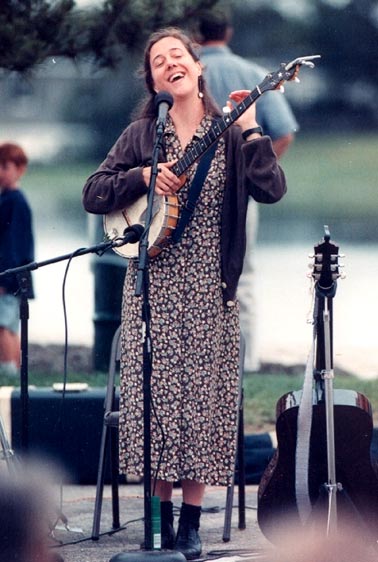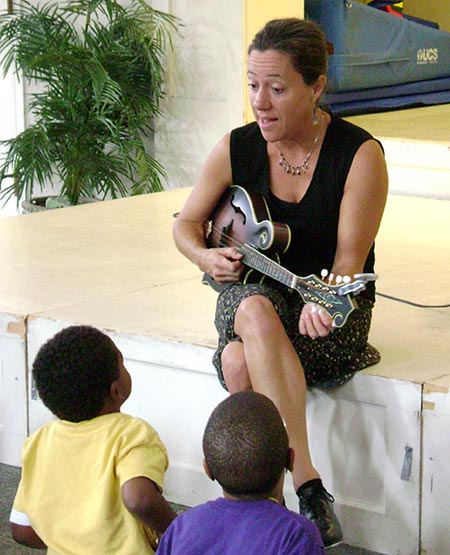24 Jun Janie’s Jumpstart, Interview with Jane Rothfield
[vc_row css_animation="" row_type="row" use_row_as_full_screen_section="no" type="full_width"...

[vc_row css_animation="" row_type="row" use_row_as_full_screen_section="no" type="full_width"...
[vc_row css_animation="" row_type="row" use_row_as_full_screen_section="no" type="full_width"...
 Bonnie wearing her favorite hat and gathering rhubarb from the Vegetable Garden for her Cooking Class.[/caption]
The hosts at the Folk School keep the show running smoothly. Unlike the year-round staff who go home at night and the regular students who are here for only a week, they are fully involved in the daily life of the School for a four month period. Without further ado… Let’s get to know a little bit about our current senior host, Bonnie Lenneman!
CP: Where are you from and what do you do there?
BL: I am originally from Michigan, but most recently I was working for a non-profit in Portland, Oregon.
CP: What about the Folk School appealed to you before you first came?
BL: Last spring I was leaving my job at the non-profit and I wanted to do something new & different that engaged both my artistic/creative side and also involved doing something outdoors. The Work/Study program was a perfect fit!* The Sing Behind the Plow motto also appealed to me - the idea of working more closely with the land and celebrating the simplicity and satisfaction of our labor. (*Bonnie came here first as a Work/Study in Fall 2013, now she is host)
Bonnie wearing her favorite hat and gathering rhubarb from the Vegetable Garden for her Cooking Class.[/caption]
The hosts at the Folk School keep the show running smoothly. Unlike the year-round staff who go home at night and the regular students who are here for only a week, they are fully involved in the daily life of the School for a four month period. Without further ado… Let’s get to know a little bit about our current senior host, Bonnie Lenneman!
CP: Where are you from and what do you do there?
BL: I am originally from Michigan, but most recently I was working for a non-profit in Portland, Oregon.
CP: What about the Folk School appealed to you before you first came?
BL: Last spring I was leaving my job at the non-profit and I wanted to do something new & different that engaged both my artistic/creative side and also involved doing something outdoors. The Work/Study program was a perfect fit!* The Sing Behind the Plow motto also appealed to me - the idea of working more closely with the land and celebrating the simplicity and satisfaction of our labor. (*Bonnie came here first as a Work/Study in Fall 2013, now she is host)
 Using clogging, music and storytelling to charm Folk School audiences since 1996, Aubrey exudes a talent, grace, and humor unique to only the most tenured and talented of performers. Aubrey returns to the Folk School this September to teach two dynamite classes: Singing with Clawhammer Banjo (Sept. 8-13) and Clogging (Sept. 13-15 - Weekend). She is also scheduled to perform in special Thursday night concert, Sept. 12, 7 p.m. Don't miss out on this opportunity to learn to play, laugh, sing, and dance with Aubrey this fall!
I recently checked in with Aubrey to talk to her about her upcoming classes, the Folk School, tunes, heroes, dance moves, folk music, the Phoebe, and more! Here's what we talked about:
CP: You teach quite regularly at the Folk School. How did you find the Folk School? When did you teach your first class?
AA: I got the idea to apply to the folk school in the mid-90s when I saw that one of my dulcimer player mentors, Lorraine Hammond, from Boston, was working there. I got in touch, sent materials, and was invited to teach my first class in 1996. I thought I had died and gone to heaven-what a unique, beautiful, nurturing, and exciting place! Teaching a 30+ hour dulcimer class felt daunting back then for my younger self. I was nearly quivering on the plane as I travelled to the Folk School. I have learned a lot over the years teaching at the Folk School. The luxury of time in the week-long class has been a great opportunity to refine and expand my teaching.
CP: Do you think anyone can learn to sing? Do you have to know how sing well to take your classes?
AA: YES to first question - I think anyone can learn to sing. Absolutely NO to second question - you do not need to know how to sing well to take my classes. This question reminds me of college when I took a few drawing classes at the Rhode Island School of Design. I realized that maybe I didn't have a deeply inherent gift, but I learned the skill quite well. Some people can easily SING and it is beautiful, like when they are three years old. Some people don't have the gift quite as well, but I have never ever denied someone who wanted to sing or learn to control the pitch of their voice better. I think of two students in particular over the years who considered themselves "tone deaf" and we worked together, trained, and over time, I heard each of them sing on pitch. There were tears. It was quite a moment, very moving!
[caption id="attachment_8338" align="alignleft" width="234"]
Using clogging, music and storytelling to charm Folk School audiences since 1996, Aubrey exudes a talent, grace, and humor unique to only the most tenured and talented of performers. Aubrey returns to the Folk School this September to teach two dynamite classes: Singing with Clawhammer Banjo (Sept. 8-13) and Clogging (Sept. 13-15 - Weekend). She is also scheduled to perform in special Thursday night concert, Sept. 12, 7 p.m. Don't miss out on this opportunity to learn to play, laugh, sing, and dance with Aubrey this fall!
I recently checked in with Aubrey to talk to her about her upcoming classes, the Folk School, tunes, heroes, dance moves, folk music, the Phoebe, and more! Here's what we talked about:
CP: You teach quite regularly at the Folk School. How did you find the Folk School? When did you teach your first class?
AA: I got the idea to apply to the folk school in the mid-90s when I saw that one of my dulcimer player mentors, Lorraine Hammond, from Boston, was working there. I got in touch, sent materials, and was invited to teach my first class in 1996. I thought I had died and gone to heaven-what a unique, beautiful, nurturing, and exciting place! Teaching a 30+ hour dulcimer class felt daunting back then for my younger self. I was nearly quivering on the plane as I travelled to the Folk School. I have learned a lot over the years teaching at the Folk School. The luxury of time in the week-long class has been a great opportunity to refine and expand my teaching.
CP: Do you think anyone can learn to sing? Do you have to know how sing well to take your classes?
AA: YES to first question - I think anyone can learn to sing. Absolutely NO to second question - you do not need to know how to sing well to take my classes. This question reminds me of college when I took a few drawing classes at the Rhode Island School of Design. I realized that maybe I didn't have a deeply inherent gift, but I learned the skill quite well. Some people can easily SING and it is beautiful, like when they are three years old. Some people don't have the gift quite as well, but I have never ever denied someone who wanted to sing or learn to control the pitch of their voice better. I think of two students in particular over the years who considered themselves "tone deaf" and we worked together, trained, and over time, I heard each of them sing on pitch. There were tears. It was quite a moment, very moving!
[caption id="attachment_8338" align="alignleft" width="234"] Aubrey charms audiences of all ages![/caption]
CP: What came first for you, playing music or dancing? How did you learn clawhammer banjo? How did you learn to clog?
AA: I started playing piano by ear at about 5 years old, then my parents started me on piano lessons. I quit at 13 and then picked up the guitar at age 15. I had a defining moment that summer in 1979. I figured out how to play two simple chords to a Beatles song and then I sang along and voila! I could play a song and then I was off and running and have never looked back. It was a major turning point in my life.
From there I learned to play the tin whistle, mountain dulcimer and in my late 20's, I went to Eastern Kentucky and started to learn clawhammer banjo and to dance. My friend Cari Norris taught me. She is the granddaughter of the legendary Lily May Ledford, leader of the first all-female string band, The Coon Creek Girls, in the early radio days, so I got to learn from a wonderful lineage of women. When I wasn't with Cari in Kentucky, I'd commission her to send instructional recordings (cassettes!), and she walked me through tunes by ear that way. That same time frame, I learned a few clogging steps (aka Flatfooting) and then over time, I learned traditional freestyle clogging by imitating and collecting steps from percussive dancers I would meet on the road. It was a wondrous and quite traditional way to learn. More than ten years later, somewhere in my 40's, I said to my husband Elwood, with some surprise, "I'm a dancer!" I had never taken dance as a child.
CP: Do you have a favorite tune right now?
AA: Yes, always. It is often whatever song I am learning at the moment. I am always having some kind of a love affair with a song. Two right now are: "The Jamestown Homeward Bound," a 19th century seafaring song and "Mornin's Come, Mariah's Gone," a Jean Ritchie song. Another song I have sung to myself all year is the beautiful hymn "Resignation" written in 1719 by Isaac Watts.
Pete Seeger is famous for saying a song can change the world and I believe that songs help heal our broken hearts. My father died last year and we lost a bunch of other old friends and family members nearly all at once. That one quiet and beautiful song has rescued me over and over again in the last year.
CP: As a musician who has performed multiple times at the Folk School, do you have a tune you always include in your set? How many times have you performed at the Folk School?
AA: I have performed at the Folk School about every year since 1996. It is one of my absolute utter favorite places in the world to play, teach and visit. When I am on that stage and looking at that roomful of smiling, warm, and, now, many familiar faces, I am in one of my happiest places. I often, but not always, play "The Devil and the Farmer's Wife" at the end of my shows. It's a silly, centuries-old song about the devil who comes up from Hell to talk to a dimwitted farmer about taking one of his family members back with him. The farmer says, "Don't take my son, I need him on the farm. But you can have my wife." Then we see how things turn out for the DEVIL. It's a very funny song, still, to this day! Someone captured in on video last time I was there:
Aubrey charms audiences of all ages![/caption]
CP: What came first for you, playing music or dancing? How did you learn clawhammer banjo? How did you learn to clog?
AA: I started playing piano by ear at about 5 years old, then my parents started me on piano lessons. I quit at 13 and then picked up the guitar at age 15. I had a defining moment that summer in 1979. I figured out how to play two simple chords to a Beatles song and then I sang along and voila! I could play a song and then I was off and running and have never looked back. It was a major turning point in my life.
From there I learned to play the tin whistle, mountain dulcimer and in my late 20's, I went to Eastern Kentucky and started to learn clawhammer banjo and to dance. My friend Cari Norris taught me. She is the granddaughter of the legendary Lily May Ledford, leader of the first all-female string band, The Coon Creek Girls, in the early radio days, so I got to learn from a wonderful lineage of women. When I wasn't with Cari in Kentucky, I'd commission her to send instructional recordings (cassettes!), and she walked me through tunes by ear that way. That same time frame, I learned a few clogging steps (aka Flatfooting) and then over time, I learned traditional freestyle clogging by imitating and collecting steps from percussive dancers I would meet on the road. It was a wondrous and quite traditional way to learn. More than ten years later, somewhere in my 40's, I said to my husband Elwood, with some surprise, "I'm a dancer!" I had never taken dance as a child.
CP: Do you have a favorite tune right now?
AA: Yes, always. It is often whatever song I am learning at the moment. I am always having some kind of a love affair with a song. Two right now are: "The Jamestown Homeward Bound," a 19th century seafaring song and "Mornin's Come, Mariah's Gone," a Jean Ritchie song. Another song I have sung to myself all year is the beautiful hymn "Resignation" written in 1719 by Isaac Watts.
Pete Seeger is famous for saying a song can change the world and I believe that songs help heal our broken hearts. My father died last year and we lost a bunch of other old friends and family members nearly all at once. That one quiet and beautiful song has rescued me over and over again in the last year.
CP: As a musician who has performed multiple times at the Folk School, do you have a tune you always include in your set? How many times have you performed at the Folk School?
AA: I have performed at the Folk School about every year since 1996. It is one of my absolute utter favorite places in the world to play, teach and visit. When I am on that stage and looking at that roomful of smiling, warm, and, now, many familiar faces, I am in one of my happiest places. I often, but not always, play "The Devil and the Farmer's Wife" at the end of my shows. It's a silly, centuries-old song about the devil who comes up from Hell to talk to a dimwitted farmer about taking one of his family members back with him. The farmer says, "Don't take my son, I need him on the farm. But you can have my wife." Then we see how things turn out for the DEVIL. It's a very funny song, still, to this day! Someone captured in on video last time I was there:
The Sunday Morning String Band,...


